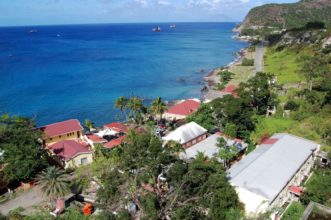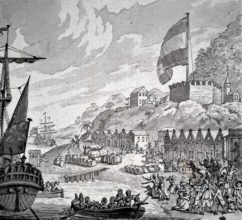The merchants of St. Eustatius were used to the presence of British warships around the island, on the lookout for ships with supplies for the rebellious settlers in North America. It therefore took some time before they realized that the fleet approaching the island on the morning of February 3, 1781, came for a different purpose.
After the warships had cast their anchor in the bay of Oranjestad, a sloop rowed ashore from the flagship. The officers on board climbed the path to the fort, where they handed the following statement to a totally overwhelmed governor De Graaff: ‘We the General Officers, commanding his Britannic Majesty’s Fleet and Army in the West-Indies, do, in his Royal Name, demand an instant Surrender of the Island of Saint Eustatius and its Dependencies, with everything in and belonging thereto, for the Use of his said Majesty. We give you One Hour, from the Delivery of this Message, to decide. If any Resistance is made, you must abide by the Consequence.’

Nest of villains
Great Britain was presented a casus belli when the Royal Navy in September 1780 intercepted an American ship on the Atlantic Ocean. One of the passengers was Henry Laurens, special envoy of the Continental Congress. In his luggage he carried the draft of a secret trade agreement between the United States and the city of Amsterdam. Surely no more evidence needed of the insidious behavior of the Dutch?
War was declared on December 20, 1780. The first war goal was set in advance: the island of St. Eustatius, ‘this nest of villains’ as commander of the British fleet admiral George Rodney put it. “If it had not been for the treasonable assistance” of the island’s merchants, “the American War must have been long since finished.”
Admiral George Bridges Rodney had a questionable reputation. No one doubted his capabilities as commander of the fleet. But there was also George Rodney the gambler, who only barely managed to keep his creditors at bay. In those days it was still customary in wartime for the crew of the fleet to share in the proceeds of the seized goods. But what was legitimate war booty in this case? All the goods or only from those traders who had done business with the Americans? And were British citizens from nearby islands who had settled on St. Eustatius excluded?

Rodney decided to keep it simple. This was a unique opportunity to free himself from all his worries. He ordered the confiscation of all goods on the island. His greed was apparent from a letter to his wife: “The riches of St. Eustatius are beyond all comprehension. The capture is prodigious.”
Rodney was asking for trouble. Soon the British merchants filed a series of complaints against the admiral, maintaining that he was not entitled to expropriate British citizens.
The worst was yet to come
But the worst was yet to come. The main purpose of occupying St. Eustatius was to cut off the supply line of the insurgents, enabling Great Britain to win the war. But George Washington was no longer fighting alone. In 1778 France had entered the war and had already sent a number of troops, though not enough to tip the balance. However, in the course of 1781 a large fleet set sail for Martinique, the main French naval base in the West Indies. It was obvious that the ships would set sail for North America from there. Thus it was of the utmost importance to prevent them doing so.
But Rodney was too busy filling his pockets and did not take the threat seriously enough – and the French fleet sailed unhindered to the American east coast. The result was a crushing defeat for the British in the Battle of Yorktown, at the mouth of the Chesapeake Bay, in October 1781. They would never overcome this blow. As Edmund Burke later declared in the House of Commons: the capture of St. Eustatius indeed ended the war, but not in the way that Great Britain had envisioned.
This is the third and last blog in the series ‘The Golden Rock’, based on Willem de Bruin’s book by the same name on the role the Dutch island of St. Eustatius played in America’s war of independence. De Bruin worked for most of his career at the Dutch daily newspaper De Volkskrant, as editor of the news section and later of the op-ed page where he was responsible for the daily editorial. He wrote essays for various sections of the newspaper on both domestic and international topics. He left the newspaper in 2011 to write books on history.




